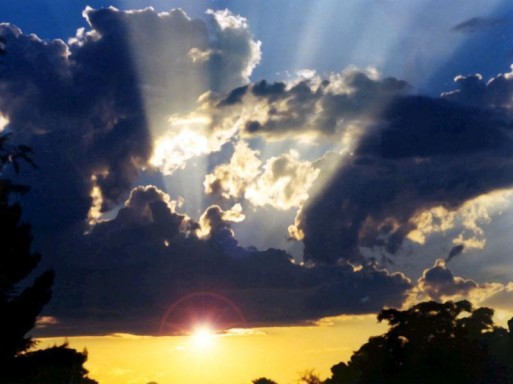 The ten-year anniversary of September 11th, 2001 is just six days from now, and because of that, I wanted to choose a piece of literature that really captured the feelings of our nation after these tragic events took place. Well, my search was fairly unsuccessful, but then serendipitously, I came across Henry Vaughan’s They Are All Gone Into the World of Light in one of my literature anthologies. While it doesn’t specifically mention a national tragedy, it does something better: it focuses on the positives of death.
The ten-year anniversary of September 11th, 2001 is just six days from now, and because of that, I wanted to choose a piece of literature that really captured the feelings of our nation after these tragic events took place. Well, my search was fairly unsuccessful, but then serendipitously, I came across Henry Vaughan’s They Are All Gone Into the World of Light in one of my literature anthologies. While it doesn’t specifically mention a national tragedy, it does something better: it focuses on the positives of death.
Firstly, Henry Vaughan describes death not as a dark, scary place, but as “the world of light” (1). He continues this light imagery when he says, “Their very memory is fair and bright,/And my sad thoughts doth clear” (3-4). All of the traditional associations of death with darkness and gloom are done away with; instead, the happiness of our memories of loved ones lights the way for us, just as they are heading toward a bright place.
Vaughan even calls theses memories “stars”: “It glows and glitters in my cloudy breast/Like stars upon some gloomy grove” (5-6). The sadness we feel when we mourn is “cloudy” and “gloomy,” but the strength of good memories is enough to diminish all of this, the way stars shed light at nighttime. The fact that the poet uses words like “glitters” shows how beautiful our memories are, and that we needn’t be sad when we think about those who have passed.
Death is also benevolent in that it provides us with hope and humility:
O holy hope, and high humility,
High as the heavens above!
These are your walks, and you have showed them me
To kindle my cold love. (13-16)
We are able to grow and move forward because of these gifts from death. They are things to be cherished, and we must appreciate them.
Because of this, in the next stanza, death is explicitly complimented: “Dear, beauteous death! the jewel of the just,/Shining nowhere but in the dark” (17-18). Death is “just”; we should not view it as an evil thing, but as something that should happen, and should be praised. It is a beacon of impartiality, inevitable for all of us. It only shines “in the dark” because it is a mystery to us. We cannot explain it, but we should be thankful for it.
This is taken even further in the next stanza:
He that hath found some fledged bird’s nest may know
At first sight if the bird be flown;
But what fair well or grove he sings in now,
That is to him unknown. (21-24)
It’s important that Vaughan uses positive imagery for the unknown place that the bird is in now; “well” in this context is another way of saying “spring.” And the fact that he calls it “fair,” and not something like “gloomy,” shows that he finds death to be a good thing, even if it is an unknown.
When reflecting on national tragedies, it is of course difficult to look past the horror of the events that transpired. But it is far better to think of the victims of 9/11 not in the midst of the calamity, but as being in a better place now; an unknown, sure, but a positive unknown. And as Vaughan says, “I see them walking in an air of glory” (9).
They Are All Gone Into the World of Light, by Henry Vaughan
They are all gone into the world of light!And I alone sit ling’ring here;
Their very memory is fair and bright,
And my sad thoughts doth clear.It glows and glitters in my cloudy breast,
Like stars upon some gloomy grove,
Or those faint beams in which this hill is drest,
After the sun’s remove.I see them walking in an air of glory,
Whose light doth trample on my days:
My days, which are at best but dull and hoary,
Mere glimmering and decays.O holy Hope! and high Humility,
High as the heavens above!
These are your walks, and you have show’d them me
To kindle my cold love.
Dear, beauteous Death! the jewel of the just,
Shining nowhere, but in the dark;
What mysteries do lie beyond thy dust
Could man outlook that mark!
He that hath found some fledg’d bird’s nest, may know
At first sight, if the bird be flown;
But what fair well or grove he sings in now,
That is to him unknown.
And yet as angels in some brighter dreams
Call to the soul, when man doth sleep:
So some strange thoughts transcend our wonted themes
And into glory peep.
If a star were confin’d into a tomb,
Her captive flames must needs burn there;
But when the hand that lock’d her up, gives room,
She’ll shine through all the sphere.
O Father of eternal life, and all
Created glories under thee!
Resume thy spirit from this world of thrall
Into true liberty.
Either disperse these mists, which blot and fill
My perspective still as they pass,
Or else remove me hence unto that hill,
Where I shall need no glass.

 “They Are All Gone Into the World of Light” by Henry Vaughan
“They Are All Gone Into the World of Light” by Henry Vaughan


 Debating Medical Aid in Dying
Debating Medical Aid in Dying
 “Help Me, Helen”
“Help Me, Helen”















